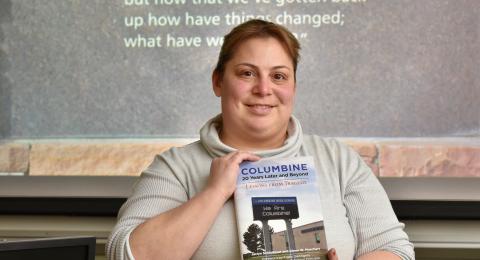SUNY Oswego professor’s book looks at legacy of Columbine shooting, 20 years later
Office of Communications and Marketing
Published
For her latest book, which looks at the legacy of the Columbine school shootings two decades later, SUNY Oswego criminal justice faculty member Jackie Schildkraut said the foundation comes from a quote in the Wall of Healing at the Columbine Memorial -- a place of remembrance that will be supported withproceeds from the book.
“It brought the nation to its knees,” the memorial reads for the shooting in Colorado that killed 13 people, injured 21 and shook up the nation on April 20, 1999, “but now that we’ve gotten back up how have things changed; what have we learned?”
In “Columbine, 20 Years Later and Beyond: Lessons from Tragedy,” Schildkraut -- an internationally recognized expert on mass shootings -- and her research partner Glenn W. Muschert of Khalifa University of Science and Technology wrestle with the question of what everybody has learned -- and still needs to learn to prevent future tragedies.
“There’s been so much written on Columbine in the past 20 years, not all of it correct, not all of it well-intended, not all of it coming from a place looking to grow from the tragedy,” Schildkraut said. “Even though these were horrific events, there are many things that have informed the past 20 years.”
No other book brings it all together like this one does, Schildkraut said, and through her contacts, interviews and donation of proceeds, this is one most closely tied to those affected.
In its 13 chapters, the book tackles how the Columbine school and community rebounded, as well as evergreen topics like police responses, school safety, legislation and media coverage.
Historical perspective
Published by Praeger, the book includes a foreword by Frank DeAngelis, who was the principal of Columbine at the time and now is a national consultant and inspirational speaker, including an appearance at SUNY Oswego in 2017.
The book “does such a great job of giving the historical perspective of the tragic event while also debunking some of the myths that have been out there for the last 20 years,” DeAngelis wrote.
“It talks about things that were done right, as well as things that were done that needed to be improved upon, and it gives a comprehensive story of the Columbine tragedy,” he noted. “It covers the role of the media. It covers threat assessment. It covers post-traumatic stress disorder. It covers all the key components of questions asked in the aftermath of Columbine that 20 years later, we’re still talking about.”
Schildkraut very much believes in the No Notoriety approach, or not focusing on the shooter and giving them the fame that many of them crave -- and which has been shown to motivate other shooters looking to find similar infamy. She said the victims and the heroes should be the focus of news coverage and future stories, a guideline she follows in her publications and tributes.
While the book can have applications for college classes, Schildkraut said the authors put it together in a way that is very readable to any audience interested in the subject.
Donating the proceeds from this book to the Columbine Memorial -- the way she has similarly had previous books support such causes as the OnePulse Foundation for a memorial for the Orlando nightclub shooting -- was an easy decision.
“It always seems like the right thing to,” Schildkraut said. “I know the people in these communities. They’ve trusted me to find the right way to tell their stories. Letting my books support those causes just seems the most appropriate.”



